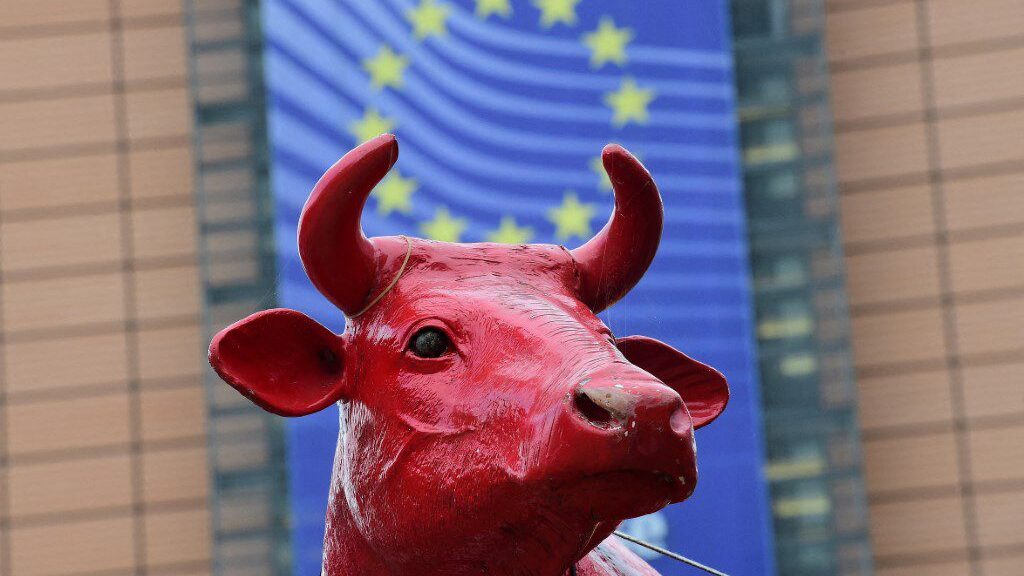
Photo: EMMANUEL DUNAND / AFP
The European Commission is set to unveil its newly revised climate policy recommendations on Tuesday, February 6th, pushing for even tougher CO2 reduction targets but also giving several—although mostly symbolic—concessions to the agricultural sector in response to the months-long farmers’ protest across the continent.
While some of the concessions may look good on paper, others continue pushing ‘green’ policies that will harm Europeans in general and farmers in particular. In practice, the Commission’s rush to Net Zero has not slowed down and will continue leading to higher food prices as European farms are forced to close down and their products are replaced by imports from countries unburdened by EU regulations.
According to the final draft of the recommendations seen by Politico, the Commission pushes for a 90% overall reduction of CO2 (compared to the 1990 levels) by 2040. Previously, only a 2030 target was set at 55% as well as complete climate neutrality by 2050. According to the Commission, the 90% emission reduction by the end of the next decade is crucial for Europe to be able to reach 100% neutrality by mid-century.
At the same time, the farmers’ protest—especially last week’s events in the European capital—has seemingly forced the Commission to add some last-minute revisions to its draft concerning the agricultural sector.
Most importantly, the final draft no longer includes previous demands for a 30% cut in CO2 emissions in the agri sector by 2040 (compared to 2015 levels), while also dropping recommendations for lifestyle changes—such as transitioning to a much more plant-based diet—and phasing out fossil fuel subsidies, which is one of the biggest sticking points of farmers who depend on subsidized diesel to operate heavy agricultural machinery amid the rising fuel prices.
According to unnamed officials, the revisions were pushed especially by Transport Commissioner Adina Vălean (Romania), Enlargement and Neighborhood Commissioner Olivér Várhelyi (Hungary), and Internal Market Commissioner Thierry Breton (France).
But even though these targets concerning the agricultural sector have been dropped from the official paper, it doesn’t mean the EU won’t expect farmers to comply to a certain degree and will likely enforce emission reductions in one way or another, diplomats say.
“Despite all the semantics in the [Commission] there is an unequivocal Impact Assessment making a very compelling (business) case for an ambitious headline target and all sub-targets for sectors,” one official said, pointing at the Commission’s implementation analysis that will accompany the revised targets.
According to this technical assessment that will also be published later on Tuesday, the 90% overall CO2 reduction goal cannot be achieved without substantial cuts in agriculture as well. In practice, this means that the Commission did not truly let farmers off the hook, but only passed the ball to the member states who, in turn, will have to decide on climate measures that potentially hurt them just to comply with the overall reduction goal.
Setting such a tough climate target for 2040 seems a bit rushed, considering that recent assessments—from both the European Environment Agency (EEA) and the Commission itself—show that the vast majority of the 2030 goals are not likely to be met in time either.
According to the EEA’s most recent report published in December, the EU is on track to miss 20 out of 28 key targets by their 2030 deadline, while the Commission’s calculations show only a 51% CO2 reduction instead of the 55% by the same date—prompting many to believe the targets were unrealistic in the first place.
Nonetheless, with the new guideline published, the ball will be in the European Parliament’s court whether they want to make binding legislation out of it. All eyes are on the largest group, the EPP, which has been going back and forth on climate targets in the past months, balancing between its leftist allies and center-right voter base.
According to the EPP’s chief environment spokesman, MEP Peter Liese, the party will “consider” approving the 90% reduction target in exchange for certain concessions, such as banning PFAS “forever chemicals” that can be found in almost every plastic product. The party’s initiative to get rid of the harmful substances was significantly watered down by the Commission last year after facing major opposition from certain industries.
At the same time, Liese also took the side of the farmers while taking a jab at the EU’s former green tzar Frans Timmermans, saying that he staffed the Commission’s climate division with “many, many people [who] who work on instruments [for] how to torture Europeans, European farmers, European industry, and so on.”
It seems hypocritical to support a climate target that’s going to hurt farmers either way while also taking their side so strongly, but the EPP is not the only one. Every parliamentary group—including the leftists—has suddenly become militantly pro-farmer despite voting to support everything they’ve been protesting in the past few years.
The Parliament will hold a plenary debate about the farmers’ protests on Wednesday.
